News and Announcements
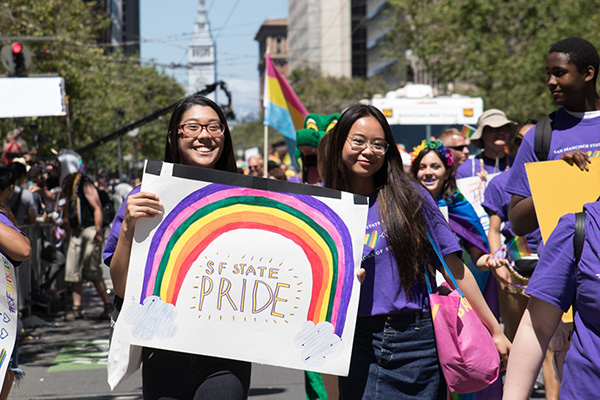
Pride Month is celebrated every June to honor the lesbian, gay, bisexual, transgender and queer (LGBTQ+) community, their history and the ongoing fight for their rights. To mark the moment this year, we spoke with Rick Nizzardini, Safe Zone Ally program co-founder and coordinating committee chair, to learn more about the program and how it’s making SF State a more inclusive place.
What is the Safe Zone Ally program?
The San Francisco State Safe Zone Ally program is a voluntary, unfunded campus program of trained students, faculty, staff and administrators who have completed an educational training to develop a greater awareness of issues affecting students of all genders and sexual identities. The program’s mission is to foster a welcoming, inclusive and equitable campus environment by building a support network for people of all gender and sexual identities. Safe Zone allies are active and visible volunteers who are open to talking to members of the LGBTQ+ community in a confidential and supportive environment.
How are program members trained?
Safe Zone trainings and ongoing learning opportunities are presented through an intersectional, racial justice framework to encourage participants to engage in conversations about the impacts of heterosexism, homophobia, transphobia and racism. Trainings are offered each semester and range from three to six hours.
What is the most memorable success story of the program during the time you’ve been involved?
The Safe Zone Ally Program is one of the longest-running LGBTQIA+ advocacy programs on our campus. We have raised awareness for issues related to gender-affirming facilities, appropriate and respectful teachings and conversations about gender in the classroom and workplace, and honoring and uplifting SF State’s queer community’s voices through programs, outreach and, above all else, education.
Several years ago, we were able to train the deans and chairs of all our campus colleges. We are incredibly proud that we have provided education to our University leaders on gender, sexuality, transphobia, intersectionality and the cross-section between queer rights and racial justice, so that they can incorporate queer-affirming educational practices in classrooms across our campus.
Why is it important to have such a program today on our campus?
Queer rights are under attack like never before during our lifetime. From bans on books that mention sexuality and/or gender, to the denial of gender affirming health care for adults and minors, to efforts to eliminate the free expression of drag artists in communities across the United States, political efforts on local and statewide levels are not only succeeding but having the effect of pushing queer people back into the shadows to find safety. Because of this, it is absolutely imperative that our voices are loud, proud and flourishing in community spaces.
We have to work together, queer people and all allies, to fight for equity, equality and social justice. We have to serve as a constant presence that says: We’re here. We matter. Our allied communities matter. And we deserve equal rights and respect.
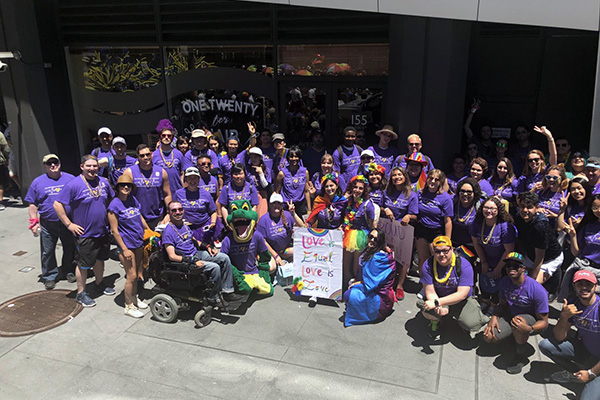
The SF State Pride Committee is excited to represent the University at the SF Pride Celebration on Saturday, June 29, and Sunday, June 30, at the Civic Center in downtown San Francisco. The committee is looking for students, staff and faculty to help at the SF State booth throughout the event. This is a great opportunity to support our LGBTQ+ Gators and connect with the local community.
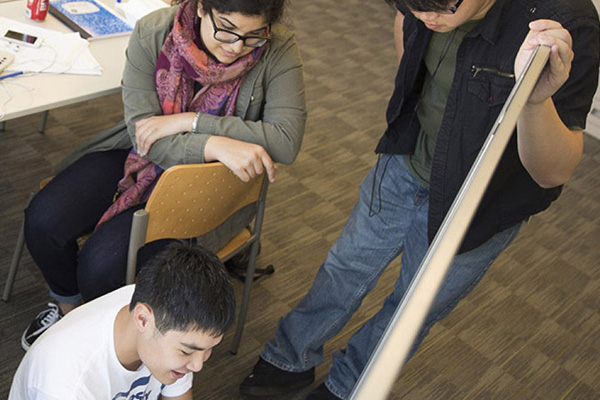
What can AI do for your students? Join Academic Technology on Thursday, June 20, or Thursday, July 11, 10 – 11:30 a.m., for “Exploring AI for Educators,” a set of virtual, hands-on workshops designed to equip faculty with the skills to effectively use generative artificial intelligence (AI) chatbots like ChatGPT and Microsoft Copilot.
In this session, delve into the art of crafting prompts and demonstrate how these powerful tools can support your work. Open to both beginners and experienced users, this event aims to provide inspiration, motivation and insights into how AI chatbots can enhance the learning experience. An expansion of AT’s “Prompt-a-thon” series, these sessions retain their core content while being tailored for a faculty audience via Zoom.
Strategic Marketing and Communications is thrilled to share updates and insights with the community about University websites. These successes signify the web team’s work to bring the best digital experience and deliver proper information to prospective and current students.
The University has increased its efforts to enhance both volume and quality of its search engine visibility for the past year. Ranking highly for keywords (common search terms) drives organic traffic to SF State sites and complements our overall paid digital marketing efforts for positioning.
This work has been implemented on over 125 web pages, including:
-
Placing keywords within the web-page content and address
-
Adding short descriptions of the web page in the back-end metadata
-
Rewriting web-page content
These efforts have resulted in a 20.5% increase in keyword ranking, which is defined as the top words that are searched on Google, of search results.
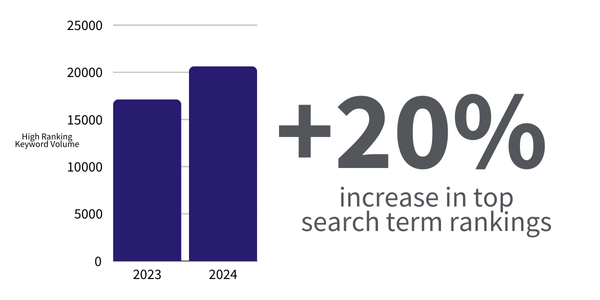
After a busy month of April, highlighted by the Explore SF State event on campus, the Future website saw a 13.6% increase in both referral traffic from Google search (11,000 clicks) and overall web traffic (216,000 users).
Updates to the Admissions page increased impressions by 16%. The page has increased its reach and is showing up higher in Google search results.
Updates to the Why SF State page saw an increase in average engagement time (the amount of time a user stays on one page). Users are staying engaged with the content on the page longer and finding the right resources.
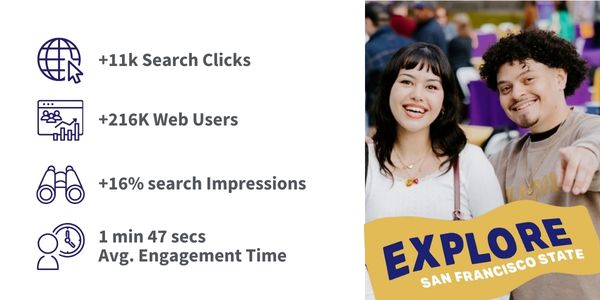
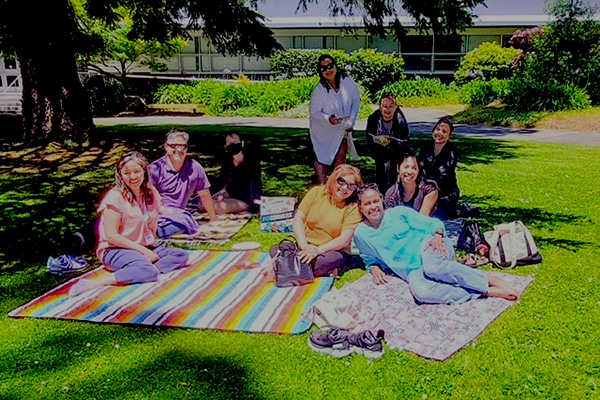
In the fall of 2022, the University established an employee resource group for SF State staff and faculty who are working parents. This group meets sporadically throughout the year for social connection, resource sharing and community. It has hosted lunches, toy/book swaps, financial workshops and many meetups. The club has an email Listserv (sfsu_staff_parentsclub@sfsu.edu) that it uses to communicate.
The club’s next meetup on campus is Tuesday, July 16, at noon for lunch. Please email Marciana Flores to participate.
Photo courtesy of Marciana Flores
Cross-Campus Collaboration provides a unique opportunity to extend workshops beyond campus borders and a different way to share professional development systemwide. Join the last workshop of the spring, “Building Trust in the Workplace,” on Tuesday, June 11, 2:30 – 3:30 p.m.
The Office of Human Resources continues to offer virtual presentations on many topics that may benefit employees, through SF State’s partnership with LifeMatters, the employee assistance program provider.
All presentations are one hour via Zoom. They will not be recorded due to any personal information shared.
Schedule:
- Friday, June 14: Elder Care Tips and Resources for Caregivers
- Friday, June 21: Transitioning to Retirement, June 28: Building Self Esteem through Positive Self-Talk
- Friday, July 2: Successful Single Parenting
- Friday, July 12: Generational Diversity
- Friday, July 19: Workplace Change
The Office of Human Resources invites all University employees to the CSU’s Got Talent webcast on Tuesday, June 18, 10 – 11 a.m. This month, “The Burnout Epidemic: A Candid Conversation about Balancing Wellbeing and Performance” will be presented by Jennifer Moss, an award-winning journalist, author, speaker and workplace culture expert.
In June, the Veteran Documentary Corps (VDC), in partnership with El Dorado Films, invites the campus community to view free screenings of four films. The films honor the service and resilience of veterans who served their country as members of the LGBTQ community.
These four films tell the very personal stories of both men and women who faced the discriminatory effects of policies like “Don’t Ask, Don’t Tell” while in the armed forces, only to face the scrutiny and judgement of others after their honorable service ended. Still, in each case, these are love stories: love of country, love of service to others and, finally, love of themselves and their partners and families.
Films:
- “Merchant Marine Paul Goercke and the Alexander Hamilton Post” now screening
- “Conte: Transitioning Politics” starting Saturday, June 8
- “Zoe Dunning: Repealing ‘Don’t Ask, Don’t Tell’” starting Saturday, June 15
- “Do Ask, Do Tell: The Linda Campbell Story” starting Saturday, June 22
To support the work of VDC, please subscribe for free to El Dorado Films on YouTube.
Join the Sutro Library for a special Pride month edition of its virtual genealogy talk series on Tuesday, June 18, at 4 p.m. Wendy Rouse will present her book “Public Faces, Secret Lives: The Queer History of the Women’s Suffrage Movement.”
The women’s suffrage movement was very queer. But the queer history of the campaign for the vote has been largely obscured. Rouse has attempted to recover some of this lost queer history by piecing together clues from the personal diaries, letters and private papers of the suffragists. This investigation has helped reveal the important role of queerness and queer suffragists in the fight for the vote.
Rouse is professor of History at San José State University. Her scholarly research focuses on the history of women, gender and sexuality during the Progressive Era. Rouse is also the author of “Children of Chinatown: Growing Up Chinese American in San Francisco, 1880 – 1920” and “Her Own Hero: The Origins of the Women’s Self-Defense Movement.”
SF State Spotlight
In a new PLOS One paper, researchers show that a class of histone proteins called H2A variants evolved distinct functions that help promote optimal fertility across species of nematode worms. The project was led by former SF State post-baccalaureate Swdha Singh, Biology Lecturer Noelle Anderson and Biology Professors Diana Chu and Scott Roy.
Histones act as spools to compact DNA so that it fits into cells. H2A is one of four canonical histone proteins. Histone variants can replace canonical histones and often impart novel functions. However, the evolution of histone variants is unclear and difficult to study. In this project, scientists used a novel method developed by Roy’s lab to track the evolution of proteins through the position of DNA sequences called introns, which are normally removed or “spliced” out before DNA is translated into proteins.
On June 4, the San Francisco Business Times covered SF State’s new partnership with Sutter Health to expand clinical placement opportunities for Nursing students. The partnership will provide eight clinical placement slots for SF State students at Sutter’s California Pacific Medical Center (CPMC) in San Francisco.
“It begins to address the nursing shortage in this country and in California,” CPMC CEO Hamila Kownacki said.
Longtime CPMC nurse Rosana Montemayor has taken on a teaching role, serving as a lecturer in the SF State School of Nursing, leading a cohort of eight students.
“Whether you’re teaching a coworker about something specific at the bedside or if you’re leading by example at the bedside, you’re always teaching and you’re always learning as well,” she said. “I think it’s a natural addition to my career.”
A May 24 story in U.S. News and World Report explores efforts by Republican lawmakers to criticize, suppress and repeal initiatives that allow non-U.S. citizens to vote in municipal elections.
Political Science Professor Ronald Hayduk notes that members of the Republican party made similar claims in the 19th century.
“They used those allegations of vote fraud, which had little evidence like today, to justify the imposition of a remarkable number of restrictive voting rules, which did in fact depress turnout voting rules,” he said.
Estuary and Ocean Science Center Research Professor and Biology Adjunct Professor William Cochlan conducted research into algae that produce a troubling neurotoxin. His research was supported by the Ocean Protection Council in partnership with California Sea Grant, authorized by Proposition 84.
In a May 22 story on the UC San Diego Sea Grant website, Cochlan says the results of the trials on ocean acidification were the most striking and unexpected.
“We found that increased ocean acidity (as measured by reduced pH values) did not increase domoic acid production rate and did not increase cellular growth rate,” he said. “This is contrary to what I’ve seen with another species we’ve tested and is in contrast with earlier studies performed by others.”
Recreation, Parks, Tourism and Holistic Health Professor Erik Peper authored “Clean the Air with Plants” in Townsend Letter: The Examiner of Alternative Medicine on June 3.